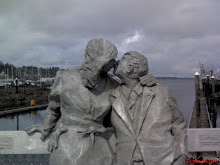I didn't really flesh out what I meant by the clever title of my last blog: "An Information Source for a Postmodern Society." The title is really an introduction to what my whole journey is about: exploring knowledge in a postmodern world.
What does the term postmodern even mean? Ironically, everyone seems to have their own definition of postmodernism. I think the Wikipedia article on the subject gets it write when it begins with the words "Postmodernism is a term applied to a wide-ranging set of developments in critical theory, philosophy, architecture, art, literature, and culture, which are generally characterized as either emerging from, in reaction to, or superseding, modernism." It's a broad concept! However, Wikipedia gets it even MORE right, because above the article one reads the following:
WikiProject Arts or the Arts Portal may be able to help recruit one.If a more appropriate WikiProject or portal exists, please adjust this template accordingly."
"The examples and perspective in this article or section may not represent a worldwide view of the subject.Please improve this article or discuss the issue on the talk page."
First of all, Wikipedia itself acknowledges the open-endedness of the information being presented, which actually helps to establish the credibility of this source. Something presented as absolute fact in a postmodern society can come across as close-minded and dogmatic, and Wikipedia does not give this impression at all. Wikipedia even defines itself as "the free encyclopedia that anyone can edit."
Secondly, Wikipedia does not make the same mistake of modernism, and that is the mistake of universalizing an experience. The article acknowledges the limitidness of the information being presented, which leads to the final point...
...the talk page. The talk page is where Wikipedians can dialogue about the information that is in question. This very idea of a talk page is a part of how Wikipedia is changing the shape of knowledge. In a postmodern society, everyone can be heard. Everyone is a part of the pursuit of knowledge. Knowledge is still power, but it is no longer reserved for the elite.
This is very unlike the print books on the shelves of the Modern Library. A community on a quest for knowledge cannot interact with information of the print book like it can with Wikipedia. Print books are set in stone, linear, absolute, presented as the final word from the expert on the given subject.
However, the shape of wisdom is changing. Conversation is a critical piece of the Postmodern Encyclopedia.

No comments:
Post a Comment